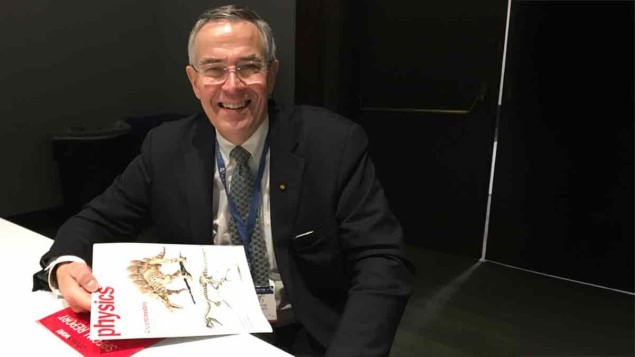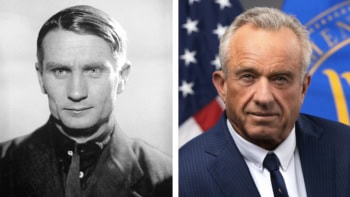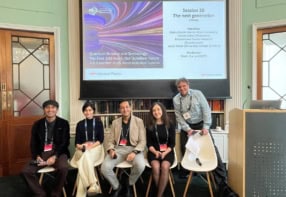US physicist Rush Holt, who spent 16 years as a Democrat in the US Congress and is now chief executive of the American Association for the Advancement of Science, talks to Matin Durrani about the prospects for science with Donald Trump as president

What’s your overall feeling of the Donald Trump administration?
I wish I could answer your question. It’s mostly uncertainty in the science community. There have been troubling signs for years about the role of science in society and policy-making – whether opinion is crowding out evidence in public debate. And that kind of concern has risen to a very high level right now: whether people understand evidence and facts or even want to distinguish between opinion and scientifically validated evidence.
What do you think Trump thinks about science?
He has not said very much about science at all. During the campaign he touched on a few politically difficult issues, questioning the safety of vaccination, challenging climate science [which] he went so far as to say was a Chinese hoax. So that has made people very suspicious of whether he appreciates science. In past years, when scientists said they were uneasy about things, they meant funding for research. But now it’s a deeper unease about whether people understand the value, nature and importance of science. That’s the overall concern right now.
How do you think funding will fare under Trump?
Congress still [controls] that – not the president – and the Congress has not changed as dramatically as the presidential administration has changed. So I think we will be – and Congress has been pretty clear about this – on a very austere budget for all non-defence discretionary activities. Even though in recent times science and research have done a little bit better than their share, there is no guarantee that will continue. And even if it does, it will be tightly constrained.
What would you say if you were in a one-to-one meeting with the president?
[I would say] we would like him to get a science adviser for himself and for each of his agencies and make sure all agencies and cabinet departments are well salted with people who understand science. I would say to the president: “You’ll have a crisis next month and the month after that. I can’t tell you what it will be. It might be an oil-well blowout. It might be an emerging disease. It might be a radiation leak. And you don’t want to get up to speed then.” I would [also] try to dispel the idea, that I believe he has, that a science adviser is simply a “plant” of the science community who is there to represent the interests of people who wear lab coasts. Rather, that person is his best defence against erroneous policies that just won’t hold up under the tests of reality.
What do you think about Rick Perry – the new head of the Department of Energy (DOE)?
The DOE is one of the largest funders of physics research in the US. A lot of people think it only deals with oil wells and wind turbines. And yes it does a little bit of that, but it also supports high-energy physics and even some biological sciences. When he was running for president [in 2012], Perry said he wanted to abolish the DOE, but in his confirmation testimony before the senate he said he’s learnt a lot about the good work done in and by the DOE. So that’s a promising sign. Of course, he does not control his own budget – that is imposed on each cabinet department. Nevertheless, it shows that some of the doubts that scientists had about the incoming administration are subject to correction. And also that maybe Perry now has a much better understanding of what it takes to maintain a good high-energy physics programme or plasma-science programme and so forth.
So might some areas of physics benefit from the new administration?
The other thing I would say [to Trump] if I received the requested audience – we’ve asked but so far heard nothing – is to get him to understand that investment in infrastructure, something he says he wants to do, can and should also include investment in human infrastructure as well as research and development. When President Barack Obama came into office and the economy was failing badly, he proposed an economic stimulus plan in which science was initially nowhere. After we made the case to Obama, there were tens of billions of new money for R&D. So maybe this president can be convinced that infrastructure also includes laboratories and equipment and grad students.
What do you think about Trump’s attempt to ban people from certain nations from travelling to the US?
What scientists are most concerned about is not funding levels, though they should be concerned about them, but the climate in which science can be practised. The ban on travel for people from designated countries [Iran, Libya, Somalia, Sudan, Syria and Yemen], has humanitarian, political, diplomatic and security concerns. Constraints on communication and on travel by scientists – so you can have the freedom to choose collaborations and build teams that are diverse – [can hamper] the progress of science. The confidence of scientists that science will be allowed to thrive has been shaken by the immigration ban and has caused a very large reaction in the science community. Other constraints on communication by government scientists – or threatened constraints – have added to [those concerns].
What might those constraints be?
When the transition team came to the DOE, someone in that team asked for information about any DOE employee who had visited a climate-change conference. The only reason they would ask for that would be to give them a hard time. So that seemed to be a constraint on the practice of good science.
What future do you foresee for the national labs under Trump?
The new president appears to be influenced by reports that have come out of one of the conservative think tanks [the Heritage Foundation] that have included calls for the privatization of the national labs. So it’s possible that this administration will make some big changes, or try to make some big changes. But I don’t think Congress would implement a call for turning national labs into corporate subsidiaries. It wouldn’t work since a lot of their work is defence-related and classified and quite varied. I’m not sure a corporation would want to undertake that – they’d have trouble seeing how they’d make a profit from running a national lab.
Who do you think’s in the running for presidential science adviser?
There have been rumours that someone who has actually met President Trump is [77-year-old Princeton University atomic and optical physicist] Will Happer. He is a well-known physicist and he has idiosyncratic ideas about climate change.
Would you be happy with him in that role?
Happer is a friend. He is a very smart person. I’d be surprised if he took it. I haven’t talked to him about it. I think he is so far from the mainstream on climate change, which is one of the big issues in science and policy-making today, that it would be difficult for him. It would be difficult for anyone who had ideas that far out of the mainstream.
Would you fancy the job?
There’s no reasonable chance that I would be selected. But if the president asks you to do a job for the sake of the country, most people would say yes. It would be hard to turn down. But I left Congress two years ago and then got this terrific job heading up the AAAS. It is important and satisfying work and because of my political record in Congress, this president would not choose me and probably would not want me at his right hand on science issues. The AAAS has offered the president help vetting candidates to look at their science accomplishments and stature. But for an adviser, he needs to choose someone who’s relatively close to his way of thinking and who he could trust.
So how do you see science panning out under Trump?
There are potential big changes but a lot of uncertainty. Meanwhile, science and physics in America are going along quite well. There is great research coming out of the universities and laboratories. In some ways we’ve never seen a better time for science. But in other ways, I guess like Charles Dickens said, we live in the best of times and the worst of times.



